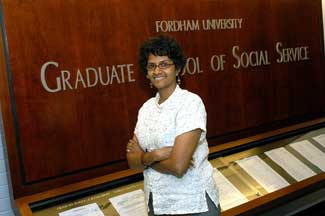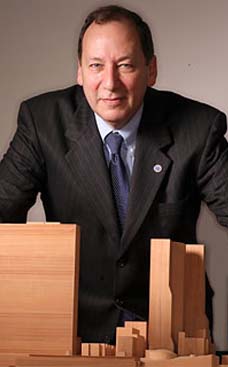
“Colonialism carries baggage,” said Menon. “Some agencies assume there is one way to bring development to communities, [and] that there is no indigenous or native way in which these communities can choose their own path of development.”
Natasha Menon, Ph.D. warns that many international civic service programs, such as the Peace Corps (which emerged during the Cold War era), may consciously or unconsciously perpetuate the notion that Western methods are superior, thereby ignoring the power differential in the host community
Professor Takes Critical Look at Limitations of Civic Programs
Natasha Menon, Ph.D., studies how decentralization of social services can affect a local community.
Photo by Ken Levinson
By Janet Sassi
In an effort to help the poor or indigent, an agency opens an AIDS clinic in a Nigerian neighborhood with an increasing number of people who are HIV positive. The clinic then languishes for lack of use.
How can that be?
It turns out that the last thing neighborhood residents want is to be seen entering an AIDS clinic and therefore stigmatized as carriers of the dread disease.
For Natasha Menon, Ph.D., assistant professor of social work, such a scenario points out the importance of understanding the social dynamics of a given community in order to effectively render social services to those most in need.
“Entering a very poor community with a we-are-going-to-serve-you mentality sets you up for a very different power differential,” said Menon. “Service has to be an engaging exercise, offering the kinds of activities where the community feels its is contributing and not just receiving. Otherwise, the characteristics of the ‘servers’ can contribute to elitism unintentionally.”
In fact, elitism is just one of a triumvirate of problems service providers can face when working to improve communities. Menon and her colleagues published an article last year in the Community Development Journal in which they argue that civic programs greatly benefit many people, but they are also susceptible to reflecting elitism, ignoring state interests and fostering imperialism—sometimes inadvertently and sometimes not.
In relation to the dangers of state interests, Menon cited research on national initiatives, such as the Nigerian National Youth Service Corps program, which are designed to promote citizenship and national identity. Though the aims of such programs may be laudable, there is the potential that they can dissolve into a morass of corruption and nepotism.
“Attention has to be paid to the sociopolitical context under which these programs are implemented,” she said.
The study also warns that many international civic service programs, such as the Peace Corps (which emerged during the Cold War era), may consciously or unconsciously perpetuate the notion that Western methods are superior, thereby ignoring the power differential in the host community.
“Colonialism carries baggage,” said Menon. “Some agencies assume there is one way to bring development to communities, [and] that there is no indigenous or native way in which these communities can choose their own path of development.”
In addition to researching community-based programs, Menon is interested in studying whether government decentralization of social service policies and programs has led to more effective delivery of services.
Decentralization, she said, has emerged as the “policy of choice” to deliver public goods and services such as medicine, food and health care. But critics argue that it is just a cover for privatization.
“International donor agencies such as the World Bank like to put forth that decentralization is one way you can move out corruption, nepotism and create efficient systems,” she said. “But the evidence for that is very mixed. My argument is that it might be possible for communities that have the means, but that not all communities do.”
Menon’s argument is based in part on findings from her dissertation, which examined 104 neighborhoods in Katmandu, Nepal, to measure the effectiveness of community collaboration. Her study found that even when community members frequently collaborated to solve neighborhood issues (water shortages, garbage collection, street maintenance), they did not necessarily observe an improvement in public infrastructure and safety.
“Collective action is neither simple nor automatic,” she said.
Menon, who grew up in India, has seen firsthand how decentralization can fail to encourage successful community participation. In India, the parliament sought to create stronger involvement of marginal groups in local development decisions by creating local government councils, known as Panchayati Raj Institutions.
Communities were given the power to choose council members, Menon said, but those who invariably ended up serving on the Panchayats were chosen by the wealthier, upper castes.
“The neglect of caste politics by the government led to the policy being hijacked by elites—the very group that the government intended to control,” said Menon. “In societies that are steeped in social cleavages … such policies are doomed to fail unless there are mechanisms that the underrepresented can use to lobby for their voices [in the process].”
Otherwise, Menon said, collective action in such a situation is rendered moot.
“Policy is not something that is abstract, it touches people’s lives,” she said. “Social workers will come to deal with . . . the void left by governments who are slowly withdrawing from public service delivery. In light of this challenge it’s important to understand how best to foster a community’s capacity and how to achieve that [capacity] through participation.”













